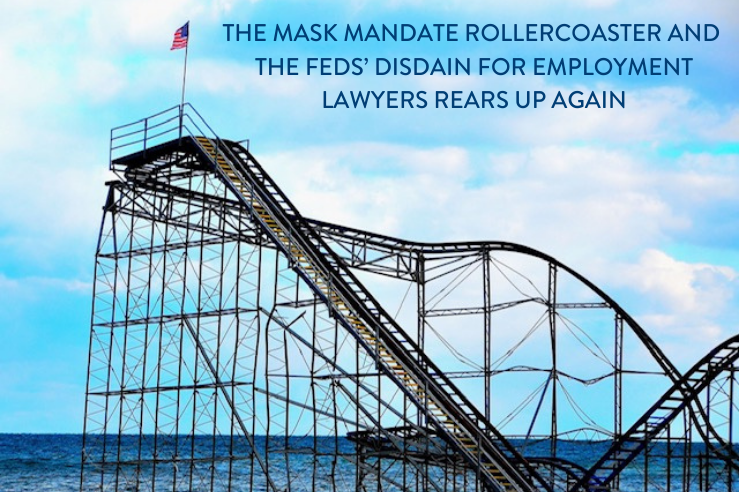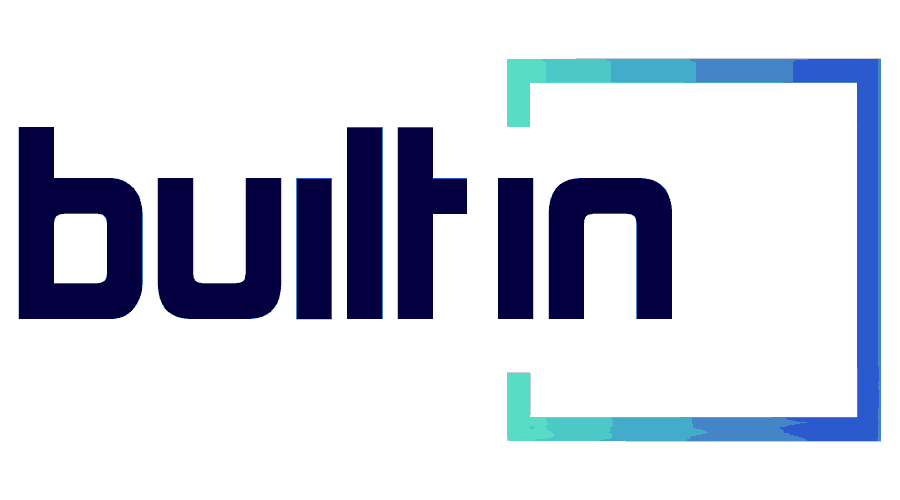
What’s with the feds continuing to use this pandemic nonsense to mess up our Memorial Day weekends–2 years in a row? On Friday May 28, the EEOC issued new guidance on employers mandating the vaccine and other related things. The most important part of this new guidance is that it’s definitive proof that we were right last year when we whined theorized that the feds must despise employment lawyers because the Treasury Department released its thousandth 14th set of PPP interim regs on the Friday of Memorial Day weekend 2020, ensuring indoor activities for us back then too. You know they’re just holding this stuff so they can release it in time to ruin all our fun—to the extent we have any. At least it rained last weekend, so feds, who got the last laugh this time?
This delightful turn of events followed a week of flip-flopping Executive Orders on masking in NJ that made us feel like we were riding the Jersey Devil rollercoaster. That insanity really started on May 13, when CDC issued guidance indicating that outdoor masking was no longer necessary and that fully vaccinated employees could be mask-free in indoor work spaces. Most states jumped on board, but not Murph, he hung back and on May 17, issued an EO saying that for indoor workplaces like offices, warehouses and factories not opened to the public, everyone needed to remain masked even if vaccinated. Not long after we broke that news to you, we got another plot twist (we thrive on employment law plot twists). On May 26, Murph changed course again and got in line with CDC and added his own flair, by issuing Executive Order 243.
So now, effective June 2, 2021, if you permit it, all fully vaccinated NJ employees can be mask free in public and non-public indoor workspaces (with some exceptions like healthcare facilities) and no longer need to stay 6 feet from their friends. But, unvaccinated workers must remain masked and 6 feet from the rest of the world, except when at their distanced workstations or in their own offices. Here’s the Murphy bonus though: unmasking is only permitted where the employee provides proof that they are fully vaccinated. Just to be clear, the EO adds that: Wherean employer is unable to determine the individual’s vaccination status or the individual is not fully vaccinated, employers must continue to require those employees to wear masks and practice social distancing. So if the employee is unvaccinated or refuses to show you proof of vaccination because they think they have some privacy rights (we’ll put an end to that myth in a minute), then you must continue to insist that only their eyes are visible at work for the foreseeable future. The irony, of course, is that as soon as they leave work they can go to the mall or ride the Jersey Devil and show everyone their full, unadorned mug. Life in Jersey!
The feds ruining yet another Memorial Day for us was so newsworthy that one of us was even interviewed about it for some news networks. The interview also briefly touched on the substance of the EEOC’s new 11 pages of guidance clarifying and updating its December 2020 FAQs. The bottom line remains the same: employers can require all employees who enter the workplace to be vaccinated unless they have a valid medical excuse (protected by the ADA) or a sincerely held religious belief (protected by Title VII of the Civil Rights Act). Of course, they say it in typical government speak. Instead of “employers can require employees to be vaccinated” they say: The federal EEO laws do not prevent an employer from requiring all employees physically entering the workplace to be vaccinated…subject to …reasonable accommodation…unless providing an accommodation would pose and undue hardship on the operation of the employer’s business. Either way, you get the gist.
So when Bob from Accounting says he can’t get vaccinated because he passes out at the sight of needles and really sharp pencils, you must engage in an interactive process with him by asking about how you might be able to accommodate his disability, which can include requiring information from his doctor. We suggest a simple accommodation: just wait til he passes out and give him the darn shot. If the Doc won’t go for that, the EEOC suggests accommodations that might include requiring Bob to wear a mask and social distance (novel ideas) or work off hours, get periodic COVID tests, remote work or reassignment. If none of these accommodations will work and you determine that an unvaccinated Bob poses a direct threat to himself or others that cannot be eliminated by accommodation, you might be able to safely end Bob’s employment (but not without risk of a lawsuit). The new guidance dives deeply into direct threat assessment. We’ll spare you the details, as that’s what you have us for. Most likely there are enough options available to work it out (accommodate) if an employee can’t get vaxed.
Among our most frequently asked questions last week was whether employers can require proof of vaccination. Some employees have the mistaken impression that employers cannot. The EEOC has now made it crystal clear that you can do so, but again backing into it with: Although the EEO laws themselves do not prevent and employer from requiring employees to bring in documentation or other confirmation of vaccination, this information…must be kept confidential and stored separately from the employee’s personnel files… That means, yes you can require proof—but it must be kept with the employee’s other medical docs. Simple enough! And in NJ, remember, if you allow the vaccinated to be maskless, you must require proof. EO 243 says so.
Meanwhile, outside our Northeast bubble, 117 hospital workers have sued their employer over its June 7 deadline for all employees to be vaccinated or risk suspension or termination. Although 99% of the system’s 26,000 employees got the jab, the holdouts claim it’s illegal to require employees to get an experimental vaccine as a condition of employment. The lawsuit claims that the employer mandate violates the Nuremberg Code, a research ethics code which prohibits forced experimentation on humans that resulted from the Nuremberg trials. Although we’re not experts on that code, it’s our guess that the vax being a job requirement is not forced experimentation, it’s just a condition of employment at that one hospital. There are lots of other hospitals that will no doubt allow the 117 employees to work without the shot. Just sayin.
And, for the first time in our lives, Montana may be the new trendsetter in employment law when last month it became the first state to make vaccination status a protected class. It was only a matter of time, but Montana, really? The law prohibits employers from discriminating against employees based on their vaccination status, requiring employees to disclose their vaccination status and mandating that employees receive a vaccine if that vaccine has only been approved for emergency use. When asked, the 6 people who actually work in Montana said they were very happy with their new law. About a third of states are considering similar bills. Stay tuned to see if COVID vaccination status discrimination lawsuits will be coming to a court near you.








